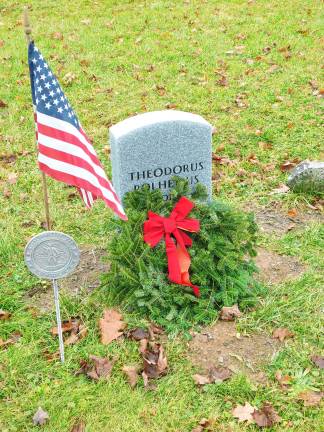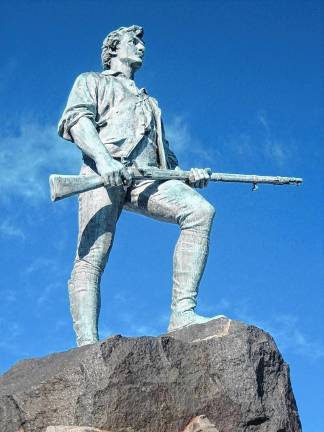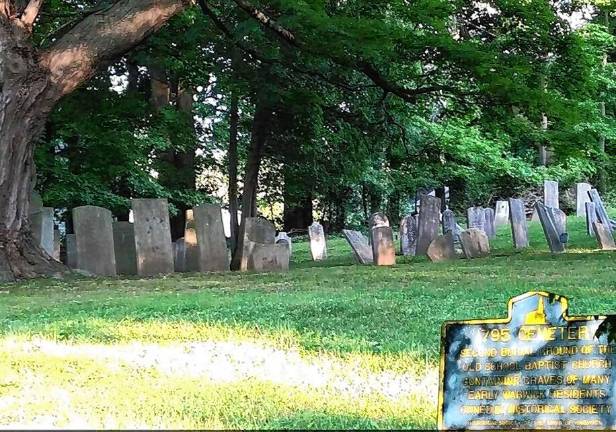250th celebration begins
HISTORY. Towns are kicking off America’s semiquincentennial birthday this spring with commemorative events, historical re-enactments and educational programming.





The signing of the Declaration of Independence on July 4, 1776, gave the United States its official birthday, but that seminal document wasn’t the first chapter in America’s story - it was the culmination of years of turmoil and discontent with British rule.
Just as the Revolutionary War began with the ride of Paul Revere and others before the Battles of Lexington and Concord in April 1775, towns throughout the country and this region are kicking off America’s semiquincentennial birthday this spring with commemorative events, historical re-enactments and educational programming.
The Middle Colonies
New York, New Jersey and Pennsylvania, which, along with Delaware, made up the Middle Colonies region of the original 13 colonies, are rich with history of the American Revolution.
Militia from New York, especially the lower Hudson Valley, played a critical role in protecting the colonial supply chain at rivers and harbors and repelling the British Navy.
The New York-Pennsylvania border saw the Battle of Minisink, the only major skirmish of the American Revolution fought in the Upper Delaware Valley. It was a decisive loss for the inexperienced settler militia.
An unmarked gravesite in Lackawaxen, Pa., serves as a memorial to unknown Revolutionary War soldiers.
New Jersey, often called the Crossroads of the Revolution, was the site of hundreds of engagements during the war, including the Battle of Trenton, fought after George Washington’s infamous crossing of the Delaware River on Christmas Day 1776.
The Continental Army also spent the winter in Morristown from 1777-1779; the Morristown National Historic Park welcomes visitors to step back in time to view the grounds and the Jacob Ford Mansion, which served as the future first president’s headquarters.
While these battlegrounds often sit at the forefront of what’s taught in school, Sussex County historian Bill Truran encourages people to think about the humanity behind the history.
“It was a time of big decisions,” he said. “People had to decide whether they would stay loyal to the British crown, stay neutral and keep their heads down, or become patriots and engage in the war. It was a decision that affected their livelihoods and their very lives.
“Families had to choose whether to send their sons to war, and patriots who were caught risked being hanged for treason. These were dangerous times.”
Sussex County, removed from the seaboard skirmishes, was a retreat and supply haven of sorts for renowned patriot families, such as the Ogdens and Morrises.
Robert Ogden II, a founder of Sparta and namesake of Ogdensburg, brought his family to Sussex County from Elizabeth, seeking refuge from the British army.
The Morris family, several members of which signed the Declaration of Independence, had a well-established estate in the Bronx and found refuge in farmlands along the Wallkill River. There, using slave labor, they grew corn and other staples to replenish what had been decimated by British raids in New York.
Evidence of the county’s rich Revolutionary history is found in its cemeteries, which are a focus of a historical marker project that Truran and others are working on in advance of the 250th anniversary of the signing of the Declaration of Independence.
“Along with the DAR (Daughters of the American Revolution), we’re trying to procure markers that list the rosters of Revolutionary War veterans and prominent civilians from that era to be placed at their respective cemeteries,” he said. “We have more than 20 cemeteries on our list that we’re working on right now. The markers would honor the patriots buried in each.”
Widespread initiatives
Last year, Truran encouraged towns in Sussex County to join RevolutionNJ, a statewide effort to commemorate not only the 250th anniversary of the Declaration of Independence but the events and people behind them leading up to the Revolutionary War.
The Board of County Commissioners, along with officials in Franklin, Sparta, Sussex Borough, Hardyston and Ogdensburg, have signed proclamations to recognize and mark the anniversary with events and commemorations from historical lectures to parades.
Passaic County is showcasing Revolutionary-era sites, such as the Long Pond Ironworks in the Hewitt section of West Milford and Washington and Lafayette’s encampment in Hawthorne, as part of its 250th anniversary celebrations.
Pike County has committed to Pennsylvania’s similar project, known as America250PA, and the New York State 250th Commemoration Commission is overseeing, cataloging and sharing events held throughout the state.
One of the country’s largest commemorative efforts, Revolution250, is taking place in Massachusetts, birthplace of the American Revolution, beginning Friday, April 18 with events honoring Paul Revere on the 250th anniversary of his fateful ride and the Battles of Lexington and Concord.
The federal government got the jump on the nation’s 250th birthday celebration by forming the U.S. Semiquincentennial Commission in 2016.
This commission, composed of members of Congress and the presidential cabinet as well as private citizens from the history and education sectors, is charged with orchestrating a nationwide effort to celebrate the milestone. Initiatives include an oral and visual history preservation project and an open invitation for people to share their American stories.
Join the celebration
The Warwick Town Historian and the Friends of Hathorn Historical Society are holding a commemoration for Col. John Cowdrey, who fought in the Battle of Lexington and remained a soldier for the duration of the war. He married and raised a family near Warwick in later years.
Cowdrey will be honored with a wreath-laying at 4 p.m. Saturday, April 19 in the Hathorn Cemetery.
The society also has a living history day planned from 2 to 7 p.m. Sunday, May 18 at the General John Hathorn Historic Site.
Morris County will begin its latest 250th anniversary celebrations on April 18 with a “Two if By Sea” lantern event commemorating Revere’s ride. All are encouraged to use the social media hashtag #TwoIfBySea to share photos of their homes and businesses lit up with two lanterns, the signaling system devised by Revere and his compatriots to alert whether the incoming British troops were arriving over land or on ships.
“Lighting two lanterns didn’t just warn a town, it activated a movement,” said Stephen Shaw, deputy director of the Morris County Board of County Commissioners and liaison to the Morris County 250th Anniversary Steering Committee. “It was the first signal in a revolution driven by ordinary citizens standing up for extraordinary ideals.”
Rev250 activities in Sussex County may be found on the Hardyston Historical website, where Truran catalogs the towns and events taking place in what he calls a three-pronged effort to “Commemorate, Learn, Celebrate.”
“This April is just the beginning of a 15-month celebration,” he said. “We have towns already planning Fourth of July parades, but we can do a lot between now and then.
“Not just our push for cemetery markers, but we can also thrust to educate and truly commemorate the importance of the Revolution and the people who fought for change.”
People had to decide whether they would stay loyal to the British crown, stay neutral and keep their heads down, or become patriots and engage in the war. It was a decision that affected their livelihoods and their very lives.”
- Bill Truran, Sussex County historian
